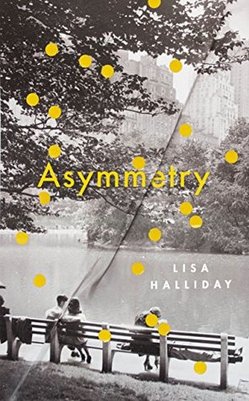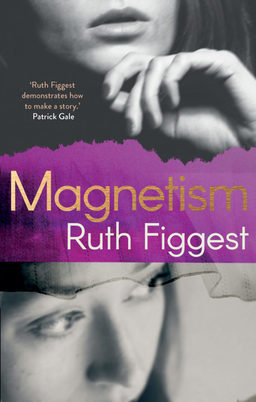Asymmetry by Lisa Halliday
En route to Kurdistan to check up on the disappearance of his brother, Amar has a stopover in London, to catch up with an old friend. But at passport control at Heathrow, the Iraqi-American economist is asked to step aside for further questioning. Amid bureaucracy’s frustrating delays, he has time to reflect on his life to date and the hostility between the two nations to which he belongs.
Ezra Blazer, the eminent writer who took a seat beside Alice on the first page, is interviewed about his life and music choices on the long-running BBC Radio 4 programme Desert Island Discs.
How do these three strands, unfolding sequentially, fit together? With fine writing, moments of connection between the three disparate narratives, and a whimsical beginning and end, Asymmetry is certainly unusual, but is it, as the blurb asserts, “a piece of shapeshifting brilliance” or a couple of novellas, with a short story in the form of an interview tucked in at the end? Does it challenge “the power plays and imbalances of contemporary life” or self-consciously draw attention to what many novels do: embracing the contrasts and conflicts that can make fiction more interesting than ordinary life? As Amar says, “It’s nothing new, disunity” (p237).
Amar’s thread was beautifully realised, and the most interesting for me of the three. How far can we trust our memories? How do we accommodate contradictions within ourselves? Or between our sense of who we are and the perceptions of others, especially if we’re regarded with suspicion by those in power? There’s also lots of asymmetry in the story of the unlikely lovers, not only in the half-century age difference, but in wealth (Ezra gives Alice money for, among other things, an air conditioning unit and a winter coat, obviously not at the same time), experience (Ezra guides her reading, and Alice shares passages with the reader ranging from Adventures of Huckleberry Finn to Holocaust accounts) and literary success (he a famous writer, albeit repeatedly missing out on the Nobel Prize; she with a boring job and writing aspirations of her own). But more disturbing is the power imbalance: I was desperate for Alice to leave the man who refuses to use a condom and controls their meetings with his phone calls signalled by CALLER ID BLOCKED.
Asymmetry is a literary debut that has already won the author a prestigious prize (Whiting Award) and will probably go on to win more. Thanks to Granta books for my review copy. For other recent reads about writers and writing, see last November’s post, Two novels about writers and the real-life characters who get beneath their skin. For a range of novels about music, see this thread.
Magnetism by Ruth Figgest
The first half of the novel focuses on the adult relationship between the women and their mutual attraction and repulsion. Their care for each other is contaminated by an urge to criticise and control. Both single when we first meet them, the mother a widow and the daughter a divorcee, we follow them through unsatisfactory affairs and a fair few medical interventions, including plastic surgery, one of the few lessons the mother has bequeathed the daughter being an anxiety about her appearance. Neither seems content although, as the more flamboyant, the mother seems better able to strive for what she wants.
I imagine many readers would recognise their own mother-daughter frustrations in the characters, which might be the source of the humour alluded to in the blurb, although I’m afraid it bypassed me. I much preferred the second half in which the daughter’s understated voice comes into its own, with a terrible poignancy in her attempt to gloss over unpalatable truths about the family, much as her mother has taught her to do. Although the reader is left to draw her own conclusions, this denial seems to have precipitated her hospital admission. (Incidentally, I thought the author’s decision to give both women a psychiatric diagnosis plausible but unnecessary. Their disturbance easily speaks for itself.)
The mother’s plight is extremely cleverly conveyed through the daughter’s account. Typical of her generation, she has expected to find fulfilment through marriage and, her exposure to “women’s lib” arriving too late, lacks the skills or supports to manage her disappointment when it fails to meet her expectations. In this I was reminded of The Autobiography of Us, and so wished the family could have had a compassionate “elder” to take care of them all. Equally moving is the daughter’s potential and earnestness as a child that the reader already knows will be unfulfilled, as well as a traumatic hospitalisation for an unspecified physical health issue at the age of eight.
If that comes across as too miserable, there is hope at the end that the daughter finds some strength in facing up to the truth after her mother’s death. Given my contrasting experiences of the first and second halves, it is difficult for me to summarise this novel; let’s say that it is, in part, an insightful and poignant portrayal of the all too common way in which parent-child relationships can disappoint, despite the best intentions of all concerned. Thanks to Myriad Editions for my review copy. For another novel told in reverse, this time exploring a long marriage, see Wait For Me, Jack.
Single-word titles are not unusual in fiction. So far this year I’ve reviewed Kintu, Sight, Consent and Upstate – and I’m grabbing this opportunity to remind readers of my own novel, Underneath. Listing them here has got me wondering about the balance between intriguing and teasing in such titles. What do you think?
























 RSS Feed
RSS Feed





















